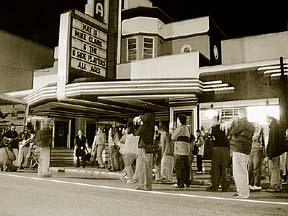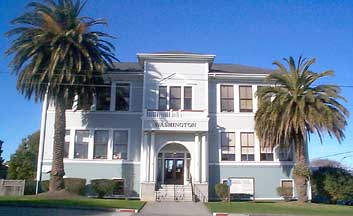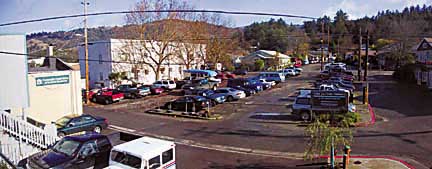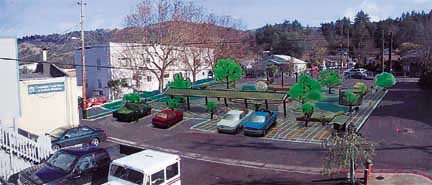| May 9, 2002 Trouble at the Arcataby BOB DORAN
The opening didn't happen. A note posted in the box office window explained that two shows planned for last weekend were cancelled because the city had refused to grant a requested dance permit. Instead Lyckitty Split, one of the bands that was scheduled to play, presented an illegal impromptu concert from the back of a rental truck, powering their amplifiers with a gas generator. The band's lead guitarist, Daniel Solomon wanted to protest what he sees as a blow to the local music scene. "There's no reason why they shouldn't have given them a permit," he said. "I don't know what's wrong with this town. It's like we're stuck in Footloose or something." It's up for debate whether the city is being obstructionist or whether the Arcata's management is playing by its own rules. In preparing for opening night Arcata's General Manager Lincoln Wachtel and the new owner, Robert White, took out 14 rows of theater seats. That created a dance floor and dramatically increased the building's capacity. What they didn't do was go to the city for permission ahead of time. "We knew we would need permits to build things. We definitely did not think we needed a permit to take things out," said Wachtel. "Apparently that's not the case." "The issue was that they removed the seats and developed a dance floor without consulting anybody as to what the impacts were," said Tom Conlon, Arcata's director of community development. Added City Manager Dan Hauser: "The city's sole concern is one of public safety. As a motion picture theater with all the seats in place it barely met the codes for emergency exit of a public venue. With the seats removed the occupancy load goes up substantially, and the building does not meet emergency evacuation standards." The city also expressed concern about whether disabled people will be able to access and exit the dance floor. White said the city has told him that the slope of the aisle (leading to the dance floor) was steeper than the disabled ramp at City Hall and thus was out of compliance. Hauser said that the occupancy of the building could be legally increased if new exists were created -- something he described as "difficult but possible." His suggestion: an exit on the north wall that would come out below the Golden Harvest parking lot. "It would have to have a ramp. It would take some work." Yet another issue is alcohol (the Arcata has filed for a beer and wine license). Police Chief Chris Gallagher said flatly that he does not want another downtown venue offering alcohol. "We are already over-concentrated with alcohol venues in the downtown area. I want to get this clear: I'm not against dancing. I'm against the number of alcohol outlets we have in a small area." Gallagher sees the Arcata as another problem for an understaffed police force. He pointed out that other college towns, Santa Cruz for example, have similar problems and are "talking about a special assessment of bars to provide police." Hauser and Conlon both suggested that a conditional use permit might be required. "This is an issue that the city needs to look at in a comprehensive way as opposed to just at a dance permit or just a liquor license or just a building permit," said Conlon. Such a permit would entail a broader look at plans including an environmental review and a public hearing. A hip-hop show scheduled for this Friday at the Arcata has been cancelled. The next event in line is a concert with Mike Clark's Prescription Renewal and the B Side Players planned for May 18. White thinks the theater will be ready. "I want to work with the city and make this happen and not just because I have a lot of money tied up in the place, for cultural reasons too," he said. "There's no other place to hear music like this in Arcata. We want to make this work. A venerable building gets noticedby MEGHAN VOGEL-FULMER
Today, the Victorian at 1910 California St. known to old-timers as the "old Washington School building" is home to the Humboldt Senior Resource Center, which offers an array of social, health and educational services to the elderly. Built exactly 100 years ago, the building is entering its second century with honors; on May 17, it will be formally admitted into the National Register of Historic Places. The 2 p.m. ceremony is expected to include appearances by Congressman Mike Thompson and State Sen. Wesley Chesbro. "Our building is truly a treasure," said Roz Keller, development coordinator for the senior center. "It has been used continuously since it was built in 1902, and we're very proud of it. It gives seniors a sense of place, and it is especially comforting to former students of Washington School, who often refer to the building as `my old school.'" Keller noted that the ceremony will also mark the 100th anniversary of Washington School. All Humboldt centenarians and former students of the school will be guests of honor, Keller said. Of the six public grammar schools built in Eureka in the early 20th Century, only the one that used to house Washington School remains, making it the last standing square schoolhouse of its kind in Humboldt County. By 1938 all other Eureka schoolhouses had been razed and rebuilt as fire hazards and earthquake safety issues became a concern. The new Washington School was rebuilt at another site across town, sparing the school's original home from demolition. It was during World War II that the building was used as an Army barracks, and it was in the late 1940s that boxing matches were held. From the 1950s to the late 1970s the Eureka City School District used it as a warehouse. After that the building was acquired by the city of Eureka, which offered it to the senior center. The center, which opened its doors in November 1983, purchased the building from the city in 1998. Although it has been restored a few times over the years, the building still retains its historic authenticity. A renovation in 1953 included new gutters, repairs to the roof and installation of asbestos siding (later removed to reveal the original wood beneath). In 1983 the building underwent a seismic retrofitting and the original balcony and balustrade designs were restored. In recent years, the senior center used grant funds to spruce the place up with a new coat of paint and a new carpet. Additionally, two palm trees out front were trimmed. The effort was overseen by the center's executive director, Mary Beth Wolford. "Mary Beth's graceful, visionary inspiration and respect for the building have restored its original beauty," Keller said, noting that Wolford was intimately involved with the project, right down to ensuring that the color scheme of the paint job matched historical patterns. The wide steps leading up to the building, flanked by a pair of double one-story columns that rise to stained glass sidelights, add an air of regal antiquity. Inside, large windows afford a striking view of Eureka. More important, perhaps, for the seniors who frequent the center is the comfortable and cheerful atmosphere of the building itself. "I worked here for many years, but it wasn't until they were painted gold that I noticed we had cherubs up there," said Keller gesturing at the ornamentation in the underside corner of an archway. The California Office of Historic Preservation initially rejected the building for inclusion on the registry of historic places on the grounds that it had been altered too much by renovation particularly the removal in the 1930s of historic ornamentation to make it safer in earthquakes. Undeterred, Keller and Wolford testified before the State Historic Preservation Office at a hearing in Davis in late January. They emphasized the building's architectural value and argued that it was important to the history of Eureka The commission was won over and sent the application for historic status on to Washington, D.C., for approval by the National Parks Service of the Department of Interior. On April 12 the center was notified of the inclusion onto the National Historic Registry. "It's a tremendous honor," Keller said. "Not many buildings qualify for listing." The May 17 festivities begin at 2 p.m. In addition to Thompson and Chesbro, local leaders, former students and members of the Eureka Heritage Society have also been invited to speak. The ceremony will include the unveiling of a bronze plaque, created by Humboldt State students, commemorating Washington School's listing on the registry. Local school bands will perform, and a cake will be lit with 100 candles in honor of the school's birthday. The ceremony will also honor area seniors and their contributions to the community, Keller said. "We have over a dozen seniors here who are over 90," explained Keller. "They're all just regular people. Their bodies may age, but their spirits remain vibrant and beautiful. Seniors are extremely devoted to volunteering and giving back to the community. They feel it's their duty to do good things." The building today retains its original function as a place of learning. The senior center offers a variety of classes on everything from gardening, woodcarving and photography to courses in foreign languages, dance, tai chi and yoga.
Town square for Garberville?In Joni Mitchell's song "Big Yellow Taxi," she rails against those who "paved paradise and put up a parking lot." If the Garberville Town Square Committee has its way, they will do the opposite, although calling a converted dirt lot paradise may be a slight exaggeration. Over the course of the last six months the committee has raised $150,000 toward the purchase of a parking lot they would like to transform into a park for the unincorporated Garberville. The park is being billed as a "town square." At Tuesday's Board of Supervisors meeting the committee presented its plans and asked the county to contribute $92,000 toward the project. The requested funds would cover the rest of the purchase price, help pay for groundwork and for operating expenses for the first year. The parcel across from Chautauqua Natural Foods, a block off the town's main drag, is owned by Chris Brannum. Purchase price for the parcel, currently used as a parking lot, is $220,000. According to committee member Dave Dickenson, a Southern Humboldt contractor, the county could draw on the $1.2 million due from the state for park development and conservation, Humboldt's portion of a $2.6 billion bond approved in the last election. Since the committee realizes it may not get help from the cash-strapped county, fund-raising efforts continue. A six-month escrow agreement with Brannum ends May 31. By that time they need to come up with at least $70,000. To raise awareness and donations the committee is holding a benefit party on Friday, May 17, in conjunction with the season's first Southern Humboldt Farmer's Market. The location: the space they hope will be Garberville's town square. For more information call Dickenson at 923-7001 or Jared Rossman at 923-2879.
Arcata likely to restrict alcoholAn alcohol and smoking ban in Arcata parks could go into effect by June 15. The proposal is expected to be adopted by the Arcata City Council on May 15. It will be enforced at Redwood Park, the Arcata Community Forest and the ball fields around the Arcata Community Sports Complex. Neighborhood playgrounds, like Cahill, Bayside and D Street parks, and outdoor basketball and tennis courts, will also be affected. The smoking restriction will allow for a 100-foot perimeter around playground equipment. The council, however, is also considering a resolution to allow drinking at picnic table areas.
|


 THERE WAS DANCING IN THE STREETS IN front of the Arcata Theater Friday, May 3, but it wasn't part of the grand opening the theater's new management had planned for that night.
THERE WAS DANCING IN THE STREETS IN front of the Arcata Theater Friday, May 3, but it wasn't part of the grand opening the theater's new management had planned for that night. IT'S SERVED AS A GRAMMAR SCHOOL, AN ARMY barracks and a courthouse. It's provided office space for the Red Cross and the Coast Guard, and warehouse space for the Eureka City School District. Its basement was once used as a boxing arena.
IT'S SERVED AS A GRAMMAR SCHOOL, AN ARMY barracks and a courthouse. It's provided office space for the Red Cross and the Coast Guard, and warehouse space for the Eureka City School District. Its basement was once used as a boxing arena.
